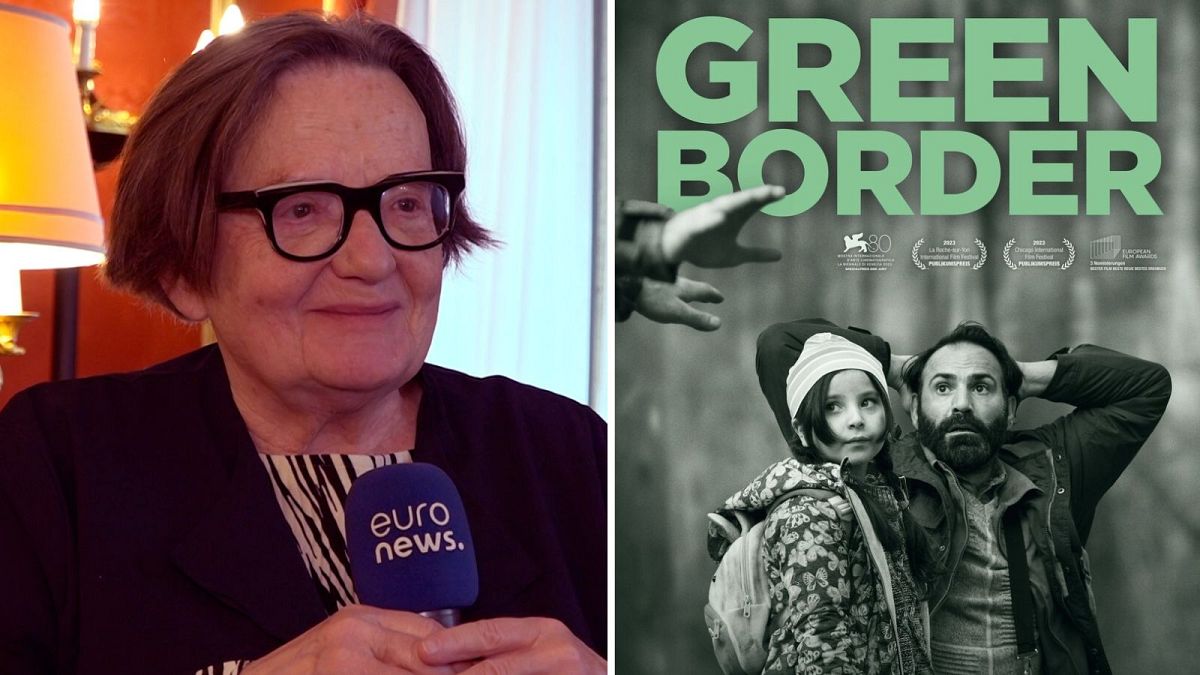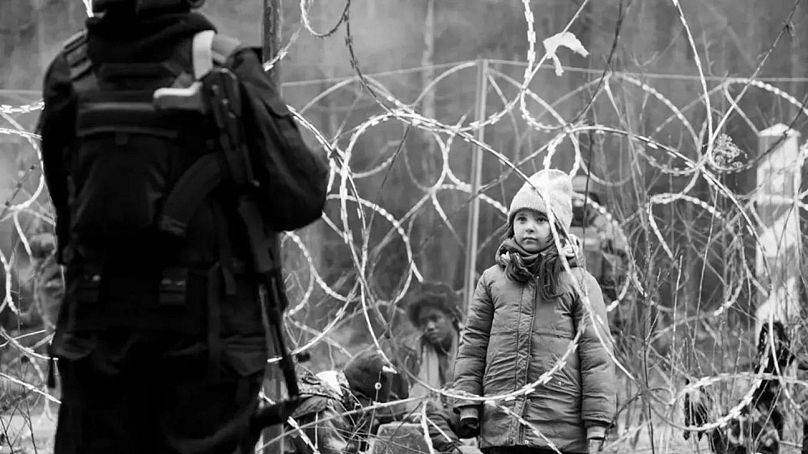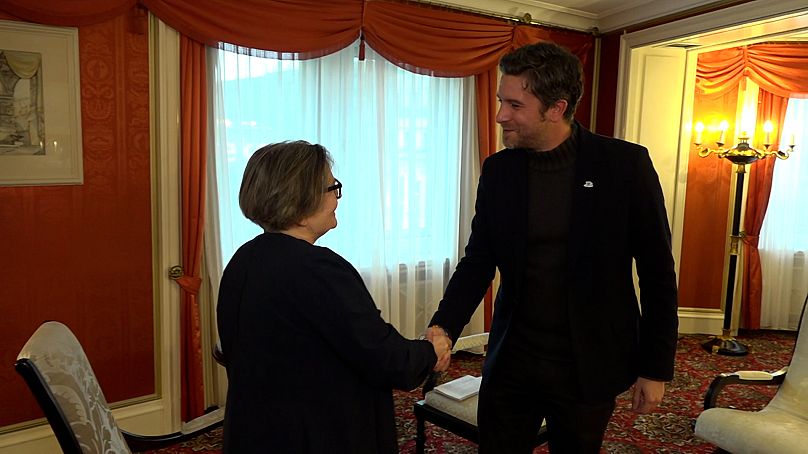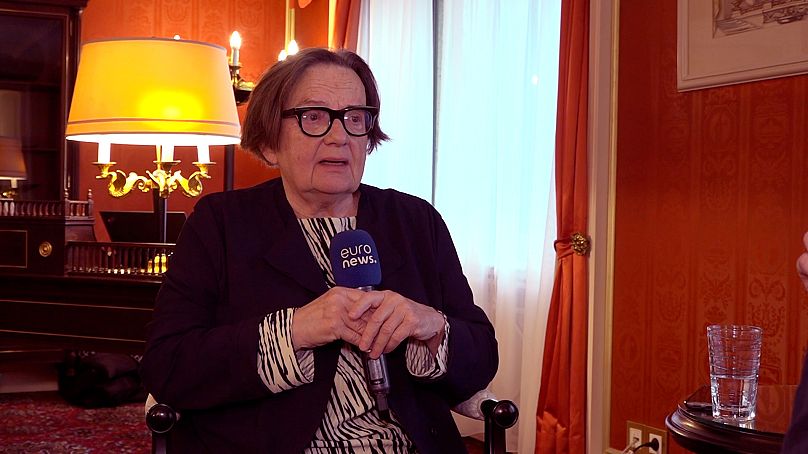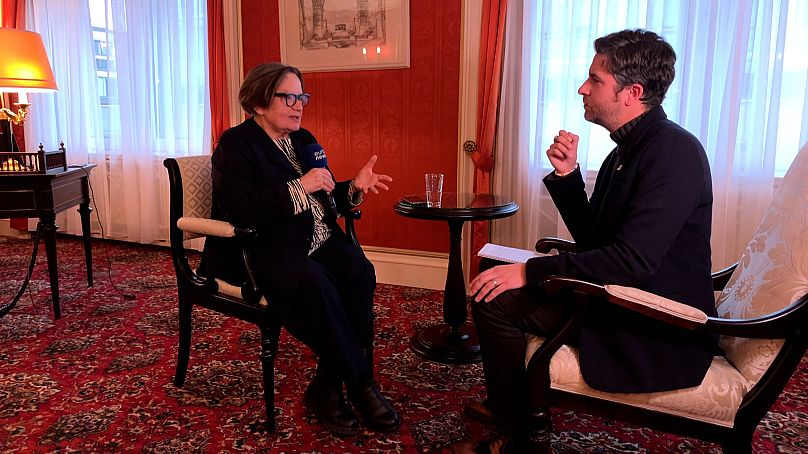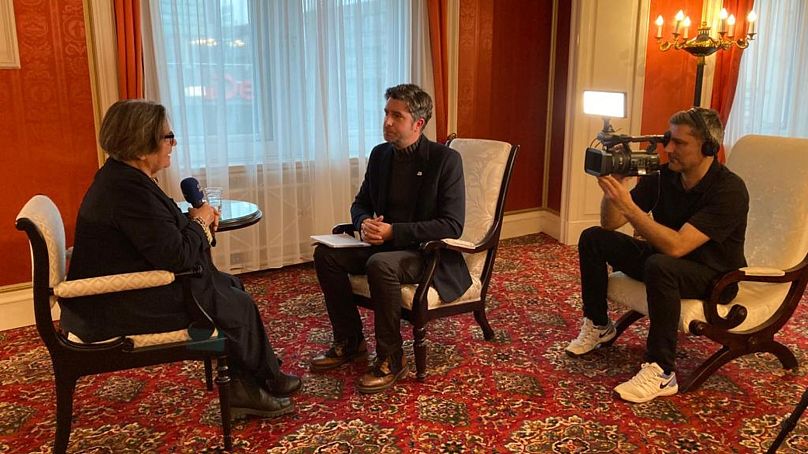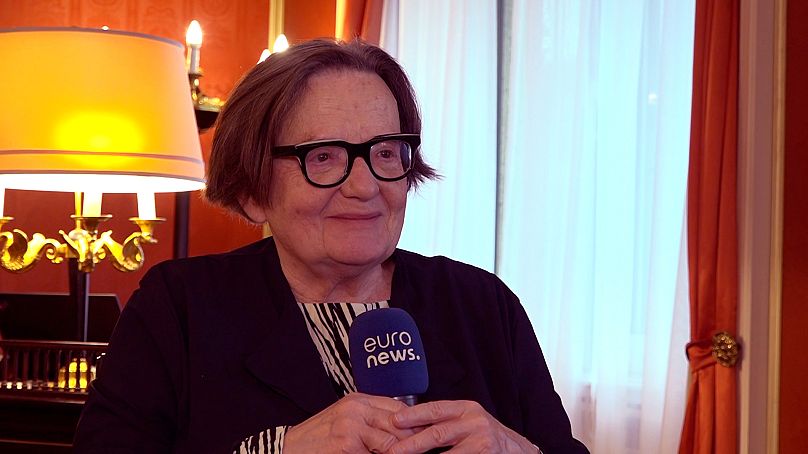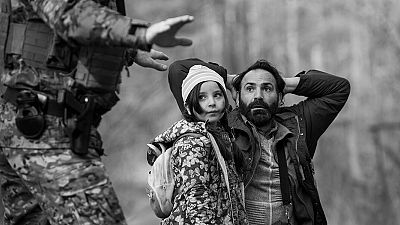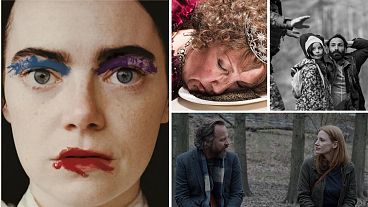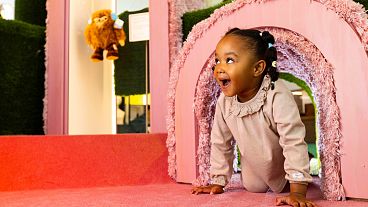Euronews Culture sits down with celebrated director Agnieszka Holland to talk about her powerful new film 'Green Border', the European refugee crisis, and the limits of cinema in facing human tragedy.
Over the course of five decades, acclaimed Polish director and current president of the European Film Academy Agnieszka Holland has brought to the screen humanity’s darkest sins.
From the Holocaust (In Darkness and Europa Europa) to the Holodomor famine in Ukraine (Mr. Jones), her unflinching films have shed light some of history’s bleakest events - Holland herself being the grandchild of Holocaust victims and a daughter of a Warsaw Uprising fighter.
Her new film, Zielona Granica (Green Border) tackles another geopolitical crime, and it is not a film you’re likely to forget in a hurry.
Chronicling the refugee crisis on the forested border between Poland and Belarus, Holland, 75, tackles a humanitarian crisis triggered in 2021 after the Belarusian leader Alexander Lukashenko encouraged migrants to travel from the Middle East and Africa to Belarus, offering his country as a gateway to Poland and the rest of the EU. In reality, the migrants were cast as political pawns in a horrific rigged game.
Green Border is not only a powerful refugee drama, but an emotionally devastating indictment of a continuing EU crisis. Alongside Jonathan Glazer’s The Zone of Interest, it is hands down one of the most gripping films you’ll see this year.
Having premiered last year at the Venice Film Festival, and won the Special Jury Prize, Holland’s quasi documentary looks at the crisis from various perspectives, following a Syrian family, the guards and their brutal mistreatment of the refugees, as well as the point of view of a Polish woman awakening to her own complacency.
The film sparked ferocious backlash in Poland just after its premiere, with then Justice minister Zbigniew Ziobro comparing Holland’s work to Nazi propaganda. “Only pigs sit in the cinema,” said the country’s president Andrzej Duda, quoting a World War II slogan used by the Polish resistance during German occupation when only Nazi propaganda films were shown in Polish theatres.
The European film community supported Holland, and the film celebrated the best opening for a Polish movie in cinemas in 2023, with 137,000 admissions over its first weekend, according to local distributor Kino Świat.
Still, Holland continued to receive death threats from extreme right-wing factions in Poland.
Not an ordinary occurrence for a three-time Oscar nominee.
Euronews Culture sat down with Agnieszka Holland to talk about Green Border, the challenges of transposing real-life tragedy onto the screen, as well as the European refugee crisis and the limits of cinema in facing human tragedy.
Euronews Culture: When I saw the film in Venice, I emerged somewhat shellshocked from the screening. One aspect of Green Border that I appreciated was that the film avoids any kind of hectoring. I didn’t feel manipulated, and by focusing more on human stories, the understanding of the situation is given a human dimension. How did you negotiate the tone of this film?
Agnieszka Holland: I’m happy this was your reaction. I tried to give a voice to the people that are voiceless, somehow. I tried to give the individuals a voice and a face, and to express the complexity of their perspective and the choices they are facing. I wanted the moral to be clear, but in terms of the structure and the human landscaping, I wanted something polyphonic and complex.
You talked to a great many locals, activists, and even to guards in preparation. Is this the most research you’ve ever done for a film?
I did historical films before regarding the Holocaust, so of course I did a lot of research then, but historical research is something different. This was much more a kind of journalistic work, meaning finding the sources, talking to them, and collecting all possible facts and points of view.
So yes, we did the very big research which went into the lives of these people, and in the places they've been escaping from. I feel that we are never shown the most drastic facts, like the cruel behaviour of the uniformed forces. But we did so, but never without having at least two independent sources verifying those facts. And when I was attacked by the governmental press and they've been saying something about lying, I always had the proofs of the truth.
Was it a difficult shoot? Because a lot of it was shot in secret and of course, by its very nature, the film did not receive any government funding from Poland.
It was a difficult shoot, but it wasn't completely in secret. I would say that it was discrete. We didn't want people to know, but at the same time we've not been shooting underground. So it was tricky, and it was a bit nerve-racking for the production, especially for the strategy of how to shoot. But we were very fast - we shot it in 24 days. We didn't want to make it a long shoot, and we also didn’t have the resources. We only had some unpleasant visitors towards the end, but most of the shoot went well, and in a quiet way.
It must have been quite punishing on an emotional level too...
I have what you might call some coldness, meaning that I am moved but I have to be distant. My obligation is to tell the story, and not to let my emotions get the better of me. That would not serve the film. And we didn’t want to make it manipulative or sentimental.
There are a lot of films at the moment which deal with modern tragedies, and in Venice, there was the film Io Capitano, which also deals with the topic of migration. Do you think that it is now, perhaps more than ever, the artist’s role, if not responsibility, to make engaged films to bring these subjects to a wider audience?
I think that it's very difficult to make engaged films, mostly for financial reasons - it's very difficult to finance films like these. There are not many sources who want to put money on these kind of subjects, including the big platforms, or even public accounts in the countries which are not on their way to becoming regimes like Poland, but in normal democratic countries.
So, I think that filmmakers are more and more aware that the world is in very difficult place, with a lot of tragedies and injustice. And as citizens and artists, we feel that we have to face it and then speak about it. But I don't see a big wave of engaged cinema. But it's obvious that we are living in a very dangerous world in which a lot of political and human tragedies are going on. Just in the last two years, there’s been Ukraine and now Israel and Gaza... So many places on the map where tragedy happens. We have an obligation to take a stand, but not all films should be political.
Are enough artists taking a stand in your opinion?
Not enough, but there is progress.
You chose to shoot this film in black and white. Can you tell me a little bit more about this stylistic decision?
I always wanted to shoot in black and white. So, since I was fully independent, it became possible! But seriously, I felt that it would help to control the aesthetic and visual integrity of the film - for technical reasons, and also for artistic reasons. I wanted to find the balance between raw documentary style and some metaphorical dimension, a timeless dimension, and black and white gave it. It was instinctive somehow. It means I didn't over analyse it... And I think it proved to be right.
You mentioned before these dispiriting reactions with regards to the film - people who have criticized it without even having seen it. Were you disturbed or shocked by the level of vitriol that was aimed at the film but also at you personally?
I expected that it would be that kind of the reaction, but the scale and scope of it did surprise me. It was before the elections in Poland, and the right-wing nationalistic government believed that they could make some points by attacking me and by creating the atmosphere of Poland being the fortress attacked by the enemy forces. And me at the front of these forces. But they overdid it. The reaction of most people has been: “What are they talking about?”
I was going to say, because their reactions, calling it Nazi propaganda, have massively backfired. It not only showed an intellectual impoverishment, because you don’t comment on something you haven't seen, but also the documentarian nature of Green Border excludes any form of sensationalism.
Right, and suddenly it was too big for the subjects, like trying to kill the mouse with the canon. The reaction of the people was opposite, and I had a lot of signs of solidarity from my co-citizens. But also, it made the awareness of the movie very high, and it helps our box office as well! And a film like this needs support.
Filmmaking is an act of hope, in and of itself, but the film’s epilogue does strike hard when you see the contrast between the reaction of the Polish government to the refugees in 2021 compared to the Ukrainian refugees being welcomed only one year later. It is a bleak reminder that at the end of the day, there is “good immigration” and “bad immigration”, all based on the colour of people’s skin...
Race plays an important role in our life again, and I think it's worldwide. I wanted to show that imbalance. At the same time, I don't want to be judgmental. It just means that people are afraid of difference. They are afraid of the things they don't understand or they feel can be threats to their comfort. Instead of being judgmental, I would like to humanize the problem and to show that we are all human beings and show the different perspectives.
With the rise of the extreme right and populist movements in Europe, a film like Green Border feels like a wake-up call and a reminder to not turn a blind eye to what’s happening on our doorstep. Are you hopeful that the EU is also waking up to some of the injustices that your film exposes?
I don't believe that one film can change the nature of global politics. But certainly, it can wake up some consciousness, and speak to people’s hearts. And we need much more than one film, and I'm not speaking only about the cinematography. I'm speaking about the political courage and honesty when facing reality. But for me, it’s not just about hope - you have to act, even if one person does not have the means to resolve the global refugee crisis. It is the ‘we’ that has to face this, the ‘we’ that needs to find solutions and not ignore the problem.
Have there been any audience reactions that have marked you with regards to Green Border?
The level of the emotional response in Poland and also out of Poland was a surprise to me. I didn't expect that the film would have such an incredibly powerful emotional impact on people. When the half of the audience have been crying when going out... At first it was silence, and after they wanted to talk and to discuss. During Q&A sessions in Poland, it felt like some kind of collective psychotherapy.
I think that we don't always have honest discussions about our fears and our deepest problems, and there’s hope when it changes, compared to the fake words on social media. And i think that film is a very effective tool to create that platform for real emotional exchange and intellectual exchange.
With regards to the European output of films, there have been some stunning releases in the past year - some of the greatest all year, not just in Europe but worldwide. Unfortunately, as much as a lot of them have been local hits, there's a problem with regards to pan-European distribution. Many films haven't always been able to get release dates in certain territories. As president of the European Film Academy, what more can be done in your opinion in order for these films to reach their audience?
Well, that is the eternal problem of at least the last 30 years. European films are not traveling in Europe, and they are not seen enough in other countries compared to just the country of origin. The films that were in the final selection of the European Film Awards, for example, are mostly the films that have pan-European distribution. And Green Border was sold practically to all European countries and beyond Europe. It has been shown during the year it started (2023), but the film will be shown mostly in 2024.
I cannot tell you exactly what to do, especially when theatrical distribution is in some kind of deep crisis. The tools we've been using slowly by surely are not effective anymore, or maybe will not be effective anymore. And the situation with the platforms and streaming goes against that kind of cinema. It means it's not curated, really. It is a question of algorithms, and artificial intelligence decides what you will see or not. And it is very difficult to pass through. I think we have to come back to the initial work, to travel from country to country with the films.
And above all, it is important to have the content which really speaks to people's hearts. We need courageous films, not only politically. For example, the film Anatomy of a Fall is not a political film, but I think is a very courageous one, in terms of the artistic perspective and way the story is told. And you know, there is an interest for that film. It is really attracting people. So, I think that we need really good films in order to break that spell!
What have been some that have marked you the most?
Well, two films recently have been the best films I've seen in a while – and I was very honoured to be nominated alongside them at the European Film Awards. I'm speaking about Jonathan Glazer’s The Zone of Interest, and about Justine Triet’s Anatomy of a Fall. Both I think are great achievements, and they speak about some real mystery of humanity.
Green Border has started its European theatrical rollout – it is already out in Poland and Germany; released in France, Belgium and Italy next week; and will hit cinemas in the Netherlands and Spain later this year.
Check out our review of the film here, as well as the video above for extracts of the interview. Below is the film's trailer.
Note: This interview was lightly edited for clarity.
